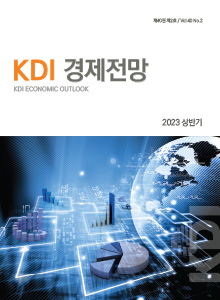KDI Economic Outlook 2023-1st Half The Impact of Rate Hikes on Young Adults’ Debt and Consumption: Implications for Policy April 26, 2023

April 26, 2023
- Summary
-
■ Rising interest rates disproportionately lowered consumption among young adults compared to middle-aged and older adults, with larger decreases observed for young adults with higher levels of debt, lower income, or weaker credit ratings.
- Those in their 20s reduced their consumption by approx. 299,000 won (1.3%), which is 8.4 times larger than the decrease of 36,000 won (0.2%) among older adults in their 60s.
- Young adults with debt in the top half experienced a consumption decrease (264,000 won, 1.1%) that was about 11 times greater than that of those without debt (24,000 won, 0.1%).
- Among the top 50% of debt-burdened young adults, those with low credit scores (700 and below) reduced their consumption by a noteworthy 539,000 won (2.2%) per year for a 1% increase in the base rate.
■ Policy makers should continue their efforts to assist younger borrowers in managing their debts at sustainable levels.
- Loan regulations, such as DSR, should account for the current and future income of young adults, considering their potential income growth over the life cycle.
- Since a considerable share (around 85%) of young adults’ debt is tied to housing, concurrent policy efforts to stabilize housing costs are crucial for managing their debt in a sustainable manner.
■ It is essential to offer young borrowers in marginal situations additional opportunities to refinance their existing debt into longer-term amortizing loans. This can help alleviate their debt burden, enabling them to gradually repay their obligations over an extended period of time.
- Given the lengthy remaining work period of young adults, facilitating debt repayment over an extended period could mitigate the risk of a sudden deterioration in debt structure. This approach would help prevent precarious financial behaviors, such as engaging in a ‘rob Peter to pay Paul’ strategy.
- | Related information |
- Any fellow MZ generation who have taken out loans for housing? (That would be me...) With both inflation and the benchmark interest rate rising, isn't the burden of interest becoming heavier and more challenging? Perhaps that's why lunch expenses are also being cut, and these days, when managing household finances, various ways of saving are being explored. How about other friends? I've looked into the spending habits of young people who have taken out loans!
- | Script |
-
Zero-spending challenge, Money-saving strategies....
It appears that millennials and Gen Z are placing greater importance on saving money rather than engaging in conspicuous consumption.
So, what is the reason behind this change in their financial behavior?
Well, when interest rates were low, young adults borrowed more than middle-aged and older individuals. Their borrowing primarily focused on housing-related expenses such as rent deposits.
Consequently, they now face significantly larger debt obligations compared to their annual earnings.
The recent increase in delinquency rates among young adults demonstrates the mounting debt burden they are experiencing.
Typically, younger individuals borrow and spend more, anticipating future income growth. They repay debts and accumulate assets in middle and older years, then liquidate assets in senior years to maintain their consumption levels.
However, young adults with relatively lower incomes and fewer assets may encounter difficulties in the event of a temporary shock if borrowing options are limited due to financial market instability.
Now, what if interest rates were to increase? How would that affect young adults who are heavily indebted?
KDI analysis found that a 1% increase in the base rate resulted in about 132,000 won decrease in annual consumption for loan holders.
It turns out that low-income and middle-income households with substantial debts exhibited the largest consumption decline.
Interestingly, the decrease in consumption was more pronounced among different age groups than among income levels.
Individuals in their 20s experienced a decrease of about 299,000 won, about eight times greater than those in their 60s and older.
Additionally, young adults with debt in the top half experienced a consumption decrease of 264,000 won, which is about 11 times greater than a 24,000 won decrease among those without debt.
Lastly, low-income households among the top 50% of indebted young adults cut spending by around 279,000 won, while those with low credit scores reduced consumption by an astounding 539,000 won per year.
Given their meager savings and limited access to loans, young adults often rely on their current income for consumption. As interest rates rise, the increased burden of debt repayment may force them to reduce their spending.
During challenging economic periods, reduced spending by young adults can lead to a contraction in the domestic market. What policy approaches could be effective in addressing this issue?
[Interview with Meeroo Kim, Fellow at KDI]
To help younger borrowers manage their debts sustainably, policymakers should focus on measures that stabilize housing costs, given that much of young adults’ debt is related to housing. Loan regulations like the Debt Service Ratio (DSR) should take into account these young adults' current and future income, as well as the potential for income growth. Another approach could be to provide more opportunities for young borrowers in precarious financial situations to refinance into longer-term, amortizing loans. This can help reduce the risk of sudden deterioration in their debt structure and ensure greater financial stability in the long run.
If you want to know more in detail?
We reject unauthorized collection of email addresses posted on our website by using email address collecting programs or other technical devices. To access the email address, please type in the characters exactly as they appear in the box below.
Please enter the security code to prevent unauthorized information collection.

